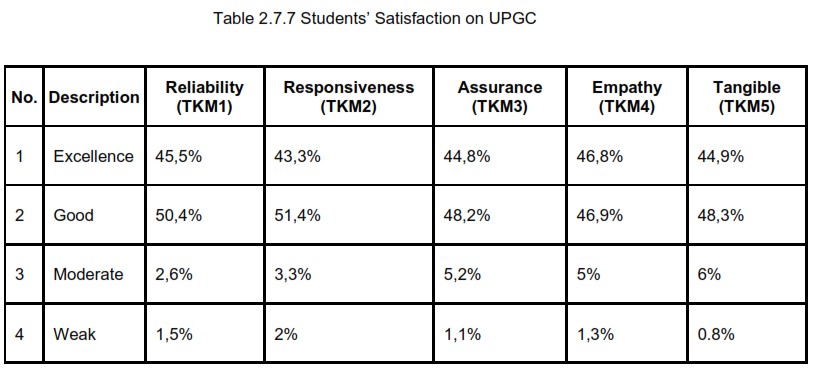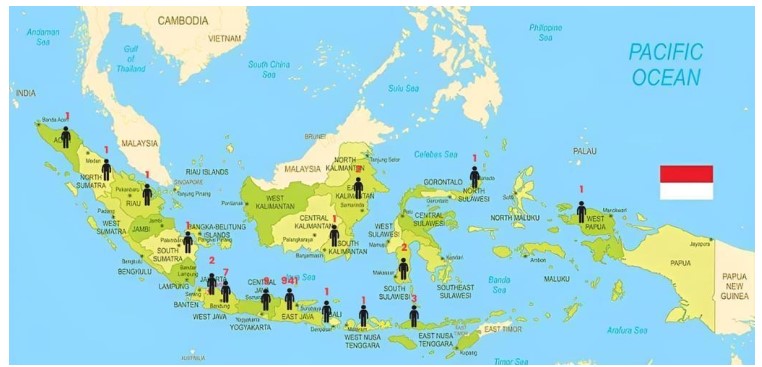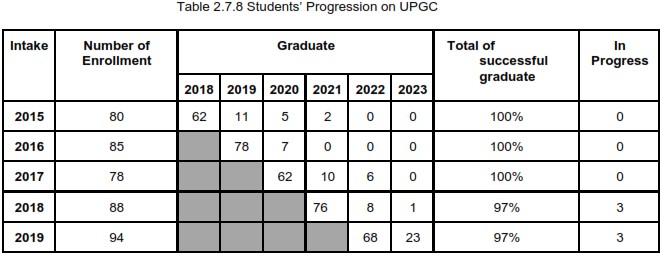The fulfillment of Key Performance Indicators (KPIs) in the Undergraduate Program of Guidance andCounseling (UPGC) is carried out in accordance with the provisions and policies set by the Ministry ofEducation, Culture, Research and Technology of the Republic of Indonesia (Kemendikbudristek RI). The process for fulfilling the Key Performance Indicators (KPIs) in the Undergraduate Program ofGuidance and Counseling (UPGC) is carried out through the following procedures: (1) Planning, (2)Implementation, and (3) Monitoring and evaluation. In the first procedure, planning, the Undergraduate Program of Guidance and Counseling (UPGC)develops a plan to fulfill the Key Performance Indicators (KPIs) derived from the strategic plan andoperational plan of the Undergraduate Program of Guidance and Counseling (UPGC). In the second procedure, implementation, the Undergraduate Program of Guidance and Counseling(UPGC) then forms an ad hoc team for Key Performance Indicators (KPIs) at the program level tocoordinate the implementation of strategic steps to achieve the Key Performance Indicators (KPIs) andperiodic monitoring. In achieving KPIs at the program level, the performance of the program issupported by ad hoc teams that are part of the faculty's ad hoc teams under Field I and Field II, namely:(a) Cooperation Team; (b) Internationalization Team; (c) Public Relations Team; (d) StudentCompanion; (e) Tracer Study Team; (f) International Relation Office (IRO) Team; and (g)Entrepreneurship Team. In the third procedure, Monitoring and evaluation, this is carried out periodically at the UndergraduateProgram of Guidance and Counseling (UPGC), conducted every three months (quarterly) through thefilling of google sheets, the results of which are centrally evaluated by the leadership of FoEUNESA.This control step is part of the supervision of academic and managerial activities. As a follow-up effortto report on the achievement of Key Performance Indicators (KPIs) every three months (quarterly), anaction plan is developed as a follow-up step for improvement or changes to activity plans adjusted tothe achievement of Key Performance Indicators(KPIs). The best achievement of KPIs in theUndergraduate Program of Guidance and Counseling (UPGC) in 2023 was KPI 5 and KPI 7 regardingthe recognition of the results of lecturer publications and courses with case study and PJBL models.The KPI report is available in Annex 2705.The UPGC study program in 2023 has evaluated the achievement of the leadership target, based onthe results of the evaluation, the achievement of the UPGC study program target has exceeded 100%.Achievement of the percentage of S1 and D4 / D3 / D2 graduates who successfully find work; continuetheir studies; or become self- employed by 135%, Achievement of the percentage of S1 and D4 / D3 /D2 students who spend at least 20 (twenty) credits off campus; Percentage of lecturers who carry outtridharma activities on other campuses, in QS100 by subject, work as practitioners in the industrialworld, or mentor students who have achieved national achievement in the last 5 (five) years,Percentage of permanent lecturers with academic qualifications S3; have competency / professionalcertificates recognized by industry and the world of work; or come from professional practitioners, theindustrial world, or the world of work by 126%, The number of research and community service outputsthat have received international recognition or are applied by the community per number of lecturersby 174%, Percentage of S1 and D4 / D3 / D2 study programs that carry out cooperation with partnersby 129%, The number of targeted study program courses for case studies and project methods is 55courses, the achievement is 80 courses that have used case methods and project-based learning,besides that in 2024 the UPGC Study Program received a superior predicate, this strengthens theposition of the BK study program which has received the highest predicate in national accreditation,namely (A) for more than 18 years. The guidance and counseling study program in 2023 received research funding from the ministry of culture or DRTPM as many as 5 research titles with a total funding of 625 million. In the field of community service, the UPGC study program also gets international funding that is in kind. In additionto funding from the international level, the BK study program also collaborates in the field of educationfor students. Forms of student akadmeik cooperation in the form of; student exchange, credit transfer,and internships. The excellence of the BK study program is also found in the many collaborations, bothnational and international, which have reached 630 cooperation documents Along with the steps to achieve the Key Performance Indicators (KPIs) in the Undergraduate Programof Guidance and Counseling (UPGC), internationalization strategies at the program level areimplemented in line with UNESA's long-term goal of becoming a World Class University.Internationalization in Undergraduate Program of Guidance and Counseling (UPGC) is coordinated bythe International Relation Office (IRO) of Undergraduate Program of Guidance and Counseling(UPGC) established in 2023. Activities focus on student mobility and lecturer mobility, withcollaboration with educational institutions and government agencies. There are severalinternationalization activities that have a significant impact on the implementation of the Tri Dharma,including Visiting Professors inviting Dr. Chew Soon Beng from Nanyang Technological University ofSingapore (NTU), Dr. Mercy KarnuiahJesuvadian from the National Institute of Education, Singapore,and Dr. Azmawati Binti Mohamad Nor from the University of Malaya, Malaysia, to conduct lecturesand training in Undergraduate Program of Guidance and Counseling (UPGC). Student mobility programs are carried out with various activities, such as international internships andouting classes that have been running for two years and collaborating with the Padang BesarMunicipality Thailand and Matsa School Malaysia. As an effort to strengthen the global academicenvironment, the Undergraduate Program of Guidance and Counseling (UPGC) has established anadvisory board consisting of experts from abroad and within the country to provide input on thecurriculum of Undergraduate Program of Guidance and Counseling (UPGC). As a step to control the quality of education in Undergraduate Program of Guidance and Counseling(UPGC), a student satisfaction survey is conducted to measure student satisfaction with managementservices, student services, financial management and infrastructure services, and educationimplementation services. The results obtained from the student satisfaction survey in 2023 are asfollows: (a) satisfaction with management services is 91.05%; (b) satisfaction with student services is94.72%; (c) Satisfaction with Financial Management and Infrastructure Services is 90.12%; (d)Satisfaction with Education Process Services is 90.17%. This indicates that the education processservices are categorized as very appropriate. Further satisfaction levels are available in the Table2.7.7.

Guidance and Counseling
undergraduate students come from various islands in Indonesia rangingfrom:
Sumatra, Sulawesi, Java, Kalimantan, Papua, Bali, Madura, Sumbawa, Kupang. The
distributionof guidance and counseling students is shown in the map below.

As an effort to track the progress and distribution of alumni, which results can be used as input for theprogram curriculum and quality learning implementation, a Tracer Study was conducted for graduates.Based on the results of the Tracer Study in 2023 for graduates who completed their studies in 2022,with a total of 70 alumni respondents and a response rate of 98.57%, the following results wereobtained: (a) 20% of graduates are entrepreneurs; (b) 10% of graduates pursue further education; and(c) 65.71% of graduates are already employed. Meanwhile, the remaining 7% of graduates are not yetemployed, and 1.43% of graduates did not fill out the Tracer Study survey.

Subsequently, the description of the Tracer Study results is used to revitalize the curriculum and provideinput on the program's career path. The program's career path indicates the career progression ofgraduates used as a guide to achieve the desired career goals. The career path for the UndergraduateProgram of Guidance and Counseling (UPGC) is shown on figure 2.7.4.

In the career path scheme above,
the competencies that graduates must possess at each career stageare outlined.
This serves as a guideline for both graduates and students to prepare the
competenciesneeded during their studies and after obtaining employment.